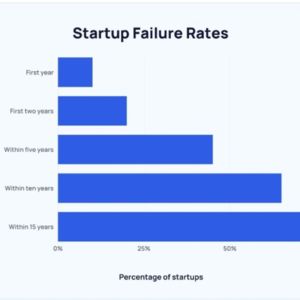Introduction
In today’s rapidly evolving tech landscape, attracting top talent has become one of the most critical factors for a company’s success.
With demand for skilled tech professionals at an all-time high, tech giants like Google, Amazon, and Microsoft are able to leverage significant budgets, attractive compensation packages, and brand prestige to attract top talent. This fierce competition often puts startups in a challenging position.

For startups, the perception that they can’t compete for top talent due to limited budgets is a common hurdle. This perception can lead to missed opportunities for startups, as they feel overwhelmed by the resource disparity. However, competing with big players for tech talent doesn’t always have to hinge on budget alone. Startups can succeed in attracting top talent by focusing on other critical areas that appeal to professionals…
This article provides actionable insights on how startups can strategically attract top tech talent despite financial constraints. From creating a compelling brand story to leveraging flexibility and innovative recruitment tactics, startups can still make themselves appealing destinations for high-caliber talent.
Understanding the Challenges Startups Face in Attracting Top Talent
- Lack of Financial Resources
Startups are often constrained by limited budgets, especially when compared to the deep financial resources of major tech corporations. Large companies can offer competitive salaries, impressive signing bonuses, and comprehensive benefits packages, including stock options, retirement contributions, and other financial perks.
Startups, by contrast, may struggle to match these offers financially, which can deter candidates looking for stability and high compensation.
Solution: While the inability to offer high salaries is a challenge, startups can counterbalance this with creative perks and non-financial benefits.
Equity options, flexible work arrangements, opportunities for rapid advancement, and the chance to work on cutting-edge projects are areas where startups can compete and even stand out.
- Brand Recognition
Brand recognition plays a significant role in attracting tech talent. Large companies have long-established reputations in the industry, with names that carry weight and credibility. This natural draw allows big players to attract talent more easily, as job seekers are often more familiar with their mission, impact, and work culture.
Startups, on the other hand, face the double challenge of building both a recognizable brand and a desirable reputation, which takes time and consistent branding efforts.
Solution: Startups should focus on building a unique brand story that resonates with potential hires. By sharing their mission, vision, and values, they can attract tech professionals who are aligned with their goals and willing to take a leap of faith for a meaningful purpose. Positioning themselves as innovative, agile, and purpose-driven, startups can appeal to individuals seeking more than just a paycheck.
- Perceived Job Security
Job security is often a concern for professionals considering joining a startup. Established companies are perceived as safer options, providing stability and predictability in contrast to startups, which are often viewed as high-risk ventures.
For tech talent—especially those with families or financial responsibilities—the potential volatility of a startup can be a significant deterrent. Startups may face challenges convincing candidates of their stability, particularly in an industry where competition and failure rates are high.
Solution: Startups can address this concern by openly communicating their vision, funding status, and future growth plans. Transparency about their business model and long-term strategy can help reassure candidates, showcasing a clear path toward growth and sustainability. Additionally, promoting a culture of resilience and flexibility can appeal to talent that is open to the dynamic nature of startup life and values the learning opportunities it presents.
- Resource Limitations
Large tech companies often have extensive resources and dedicated teams for recruiting, onboarding, and retaining employees. These companies can afford specialized recruiters, advanced recruitment tools, and lengthy hiring processes to identify the best talent.
Startups, however, may lack both the personnel and the tools to conduct elaborate recruitment campaigns, often relying on a small team to handle multiple responsibilities.
Solution: Despite these limitations, startups can leverage their agility to streamline recruitment and create a more personalized hiring process. Unlike the bureaucratic structure of larger corporations, startups can offer a faster and more flexible hiring experience, which can appeal to tech talent eager to join a team without undergoing lengthy interview processes.
Why Top Tech Talent Is Drawn to Startups

- Career Growth and Development Opportunities
One of the primary reasons top tech talent is attracted to startups is the potential for rapid career growth and development. Unlike large corporations, where promotions can be slow and skill-building often follows a defined structure, startups offer a more dynamic environment where employees can wear multiple hats.
This versatility enables tech professionals to develop a broad skill set more quickly and gain exposure to various aspects of business operations, from product development and design to customer interaction and strategy.
In startups, career advancement isn’t solely based on tenure or hierarchy; it’s often driven by merit, results, and initiative. This meritocratic environment allows talented professionals to move up the ranks and take on leadership roles faster than they might in larger organizations.
For individuals who value quick career progression and are willing to embrace the demands of a fast-paced environment, startups present a compelling option.
- Impact and Purpose
Many tech professionals are motivated by the desire to make a meaningful impact through their work. Startups, with their smaller teams and agile structures, allow employees to see the immediate results of their efforts. Unlike larger organizations, where projects may get bogged down by lengthy approval processes, startups provide tech talent with the chance to work on projects that directly affect the company’s success and customer satisfaction.
For professionals who value purpose-driven work, startups offer a unique appeal. Working at a startup often means being a part of a team that is innovating or solving real-world problems, creating a deep sense of purpose and alignment with personal values. This sense of meaning can be incredibly rewarding and is one of the most attractive aspects of startup life for many tech professionals.
- Ownership and Autonomy
Startups are known for giving employees a high degree of autonomy, which can be highly appealing to tech talent seeking independence in their roles. At a startup, employees often have greater ownership over their projects, decision-making responsibilities, and opportunities to innovate. This level of autonomy is less common in large corporations, where roles are more narrowly defined and decisions may be made by upper management.
The autonomy offered by startups fosters a culture of empowerment, where tech professionals can experiment, take risks, and see their ideas come to life without being constrained by rigid corporate policies. This independence can lead to greater job satisfaction and a sense of personal accomplishment, as employees feel trusted to bring their creative ideas to the table.
- Innovation and Cutting-Edge Projects
Startups are inherently focused on innovation. As smaller players in a competitive field, they often prioritize creativity and cutting-edge technology to differentiate themselves in the market. For tech talent, the opportunity to work on innovative projects and groundbreaking solutions is incredibly appealing. In startups, employees frequently work on products and services from the ground up, participating in the entire lifecycle of a project, from initial concept to market launch.
This environment is ideal for tech professionals who thrive on challenges and want to push the boundaries of their technical knowledge and skills. In contrast to large companies, where employees may be assigned to established products or smaller facets of larger projects, startups allow tech talent to make a tangible impact on new projects, which can be both exciting and professionally fulfilling.
Building a Strong Employer Brand for Startups

- Defining and Communicating Unique Selling Points
For startups to compete with big players, it’s essential to define and communicate their unique selling points (USPs) as employers. Startups often have distinct cultures, missions, and values that can resonate with specific segments of tech talent. To attract top talent, a startup needs to clarify what sets it apart—whether it’s a flexible work culture, a focus on innovation, or a mission-driven approach to solving meaningful problems.
Startups can develop clear messaging around these USPs and use them as the foundation of their employer brand. By highlighting their unique culture, growth opportunities, and the impact potential employees can make, startups can attract individuals who are not just looking for a job but are searching for a workplace that aligns with their values and aspirations.
- Using Social Media and Digital Presence
Social media is a powerful tool for startups to showcase their company culture, values, and work environment. Platforms like LinkedIn, Twitter, and Instagram offer excellent opportunities to share behind-the-scenes glimpses into the company, highlight team achievements, and post about ongoing projects. Sharing content that reflects the startup’s values, diversity, and team spirit helps create a more authentic image, one that tech talent can relate to and feel excited about joining.
In addition, having a professional and updated digital presence—through a well-maintained website, blog posts, and thought leadership content—can help startups attract talent by establishing their credibility and showcasing their work. By engaging potential hires on digital platforms and maintaining an active online presence, startups can make a strong impression on tech professionals who prioritize company culture and values.
- Building a Reputation for Innovation
Startups can build their reputation by positioning themselves as pioneers in their field. They should highlight the innovative work they are doing, whether through partnerships, industry awards, or unique product features that set them apart. Becoming known for innovation and forward-thinking projects can be a significant draw for tech talent, especially those who are eager to work at the cutting edge of their industry.
Startups can amplify their reputation for innovation by publishing case studies, technical blogs, and insights on industry trends, demonstrating their commitment to excellence and expertise. Attending or speaking at industry events, sponsoring relevant tech conferences, and supporting open-source projects can also enhance the startup’s reputation as an exciting place to work.
- Employee Advocacy
Employee advocacy is one of the most effective tools for strengthening a startup’s employer brand. Current employees can be encouraged to share their positive experiences and stories on social media or through testimonials on the company’s website. Employee advocacy not only improves the startup’s credibility but also helps potential hires gain insight into the company’s culture and values directly from the people who know it best.
Startups can also create formal programs to encourage employees to act as brand ambassadors. For example, they can offer incentives for employees who share job postings or create an ambassador program that encourages employees to participate in events, write blog posts, or produce content related to their work experience. Prospective employees are more likely to trust the opinions of existing team members than marketing messages, making employee advocacy a valuable tool for startups looking to attract top tech talent.
Crafting a Competitive Compensation Package

- Equity and Stock Options
For startups that may not be able to compete with the high salaries offered by big players, offering equity and stock options is a powerful way to attract top tech talent. Equity can provide employees with a long-term financial incentive, giving them a vested interest in the company’s success. This setup is particularly appealing to entrepreneurial-minded individuals who see the potential for significant future returns as the company grows and becomes more successful.
Offering stock options aligns the goals of the company and its employees, creating a shared purpose and motivating talent to work towards the company’s success. Startups should clearly communicate the potential value of equity, helping candidates understand how it can provide a substantial return in the long run, especially if the company grows or goes public.
- Flexible Benefits
In today’s work environment, many professionals value flexibility as much as, if not more than, monetary compensation. Startups can offer attractive non-financial perks that enhance work-life balance, such as flexible work hours, remote or hybrid work options, and unlimited vacation policies. These benefits appeal to tech talent looking for autonomy in their work schedules and the ability to work from various locations.
Startups can also consider offering learning and development budgets, which can be particularly attractive to tech professionals eager to advance their skills. These budgets can cover costs for online courses, conferences, or certification programs, showing employees that the startup is committed to their growth and professional development.
- Emphasis on Career Growth and Learning
One of the biggest appeals of joining a startup is the opportunity for fast-tracked career growth and skill development. Startups can include tailored career development opportunities in their compensation packages to provide a non-monetary benefit that resonates with talent looking to build a strong career foundation.
Promoting internal growth through mentorship programs, continuous learning initiatives, and clear career pathways demonstrates that the startup is invested in its employees’ professional journeys. This can make up for limited financial compensation, as employees may see more long-term career benefits and learning opportunities compared to roles at larger companies where career progression might be slower.
- Highlighting Intangible Benefits
Intangible benefits can be just as valuable as monetary ones, especially for tech talent who care about mission alignment and meaningful work. Startups should highlight the unique aspects of their company culture, mission, and values in their compensation package to attract individuals seeking purpose in their careers. Mission-driven work can be highly appealing, particularly to tech professionals who want to make an impact and contribute to projects that matter.
By showcasing the impact employees can have on the company’s growth and its customers, startups can attract tech talent that prioritizes purpose over high salaries. These professionals are often drawn to the chance to help shape a company’s future, creating a sense of fulfillment and ownership in their roles.
Leveraging Creative Recruitment Strategies

- Tap into Niche Networks and Communities
One way startups can stand out in a competitive market is by tapping into niche communities where tech talent gathers. These communities include online forums, tech meetups, hackathons, and specialized job boards where professionals connect over shared interests and expertise. By becoming active participants in these spaces, startups can directly engage with potential candidates who may not be actively seeking new opportunities but are open to exciting projects and connections.
Startups can join online communities on platforms like GitHub, Stack Overflow, and Reddit, as well as local tech groups. Hosting workshops, webinars, or tech talks can also position the startup as a knowledgeable player in the industry, attracting tech professionals who value learning and networking.
- Flexible and Remote Work Policies
Offering flexible and remote work options is a significant advantage that startups can leverage to attract tech talent, particularly in a post-pandemic world where remote work has become the norm. Many larger companies are shifting back to in-office work, so startups can differentiate themselves by allowing remote or hybrid work, appealing to professionals who prioritize work-life balance and flexibility.
By offering flexible work policies, startups can broaden their talent pool to include candidates from different geographical regions. This expands the potential for hiring diverse and specialized talent who may not be available locally. Promoting a remote-friendly culture can also be an attractive incentive for professionals who appreciate the freedom to work from anywhere.
- Referral Programs
Establishing employee referral programs can be a cost-effective way for startups to tap into their current employees’ networks and find quality candidates. Referred candidates often have a higher likelihood of being a cultural fit and are quicker to onboard due to their familiarity with the company through their referral source. Referral programs are also beneficial in smaller startups where hiring resources may be limited, enabling current employees to contribute to building the team.
Incentivizing referrals through bonuses, extra vacation days, or other perks can motivate employees to recommend talented individuals. This approach not only saves time and resources in the recruitment process but also creates a sense of community and involvement among employees.
- Hiring for Potential Over Experience
Startups can adopt a hiring philosophy that focuses on candidates’ potential and cultural fit rather than strict experience requirements. Since startups are often fast-paced and require adaptability, hiring for potential allows companies to bring in individuals with a growth mindset and the willingness to take on challenges, even if they may not have all the necessary experience upfront.
This strategy opens the door to emerging tech talent who may not yet have years of experience but have shown strong skills, a desire to learn, and a commitment to innovation. By focusing on candidates who are passionate about the company’s mission and values, startups can build a team that is engaged, motivated, and aligned with their goals.
Case Studies: How Successful Startups Attract Top Talent

Real-World Examples
- Slack: When Slack was an early-stage startup, it competed against giants in the communication and tech industry. Slack focused on creating a collaborative, open, and creative work culture, which was highly appealing to tech talent. Rather than simply offering high salaries, Slack provided meaningful equity, a flexible work environment, and career growth opportunities.
These factors helped Slack attract engineers and developers who valued autonomy, purpose, and the chance to build a product from scratch. Slack’s emphasis on transparency and mission-driven culture also attracted tech professionals interested in creating impactful tools for workplace productivity. - Flutterwave: Flutterwave, a Nigerian fintech startup, faced fierce competition from global payment platforms but succeeded in attracting top African tech talent by focusing on a mission to simplify payments across Africa. Flutterwave offered employees opportunities for growth, skill development, and stock options, making it a desirable place for ambitious tech professionals.
The company also fostered an inclusive and collaborative culture, where team members had significant responsibility and input on projects that affected millions. By emphasizing innovation, local impact, and ownership, Flutterwave became a top choice for tech professionals looking to make meaningful contributions within the African fintech landscape. - Paystack: Another Nigerian fintech success, Paystack, rapidly emerged as a leader in digital payments in Africa by creating a culture that appealed to top tech talent. Paystack’s strong mission to improve financial accessibility across the continent attracted tech professionals eager to contribute to social impact.
The company offered employees competitive compensation, growth opportunities, and the chance to shape Africa’s digital payments ecosystem. Paystack’s commitment to transparency, team collaboration, and skill-building opportunities positioned it as an attractive option despite competition from larger payment companies.
Key Takeaways
- Equity and Purpose-Driven Mission: Slack, Flutterwave, and Paystack attracted tech talent by offering equity and a mission-driven approach, aligning with professionals who want their work to have a meaningful impact.
- Inclusive and Growth-Oriented Culture: By fostering open and collaborative environments, these startups attracted individuals who valued autonomy, professional growth, and purpose.
- Relevant Perks and Impactful Work: Offering stock options and highlighting opportunities to impact millions, Flutterwave and Paystack created environments where talent could thrive and grow.
These examples show how startups can compete with larger companies by emphasizing mission, equity, and a strong, inclusive work culture to attract and retain top tech talent.
Conclusion
Attracting top tech talent is no easy feat for startups, especially when competing against big players with larger budgets. However, with thoughtful strategies, startups can position themselves as exciting, purpose-driven workplaces that offer tech professionals more than just a paycheck. By emphasizing unique strengths—such as a flexible work environment, opportunities for rapid career growth, a mission-driven culture, and the chance to work on innovative projects—startups can appeal to talented individuals who value impact and purpose.
Startups that embrace their distinct advantages can attract the talent they need to fuel growth, achieve their goals, and compete successfully with larger companies in the tech landscape.
Ready to implement these strategies and attract top tech talent to your startup? Betternship can help!
Visit Betternship today to learn how to get started in building a thriving team for your startup.
One Response